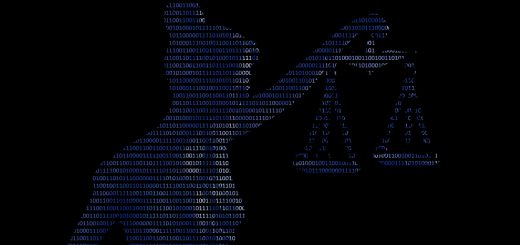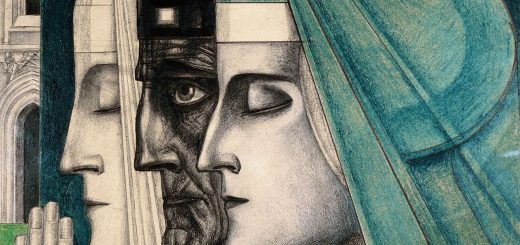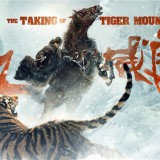9. History and Meaning
March 18th 2020, Wednesday
Dear Blog,
I started to watch Westworld against my better judgment. I made a plan to not watch any new shows during the time of the quarantine in order to think more, but here we are. It all began when I watched an interview with Jonathan Nolan and Lisa Joy a few days ago. They seem like really eloquent people. They mentioned how in the new season they are moving past the park and going into the human world, seeing how humans all live in the tiny loops like machines as well. I think that was the moment when I decided to watch the show, just to see how the two showrunners can bring this central theme to life. I would also like to point out that they are just so cute together. I like a power couple when I see one. By the way, did you know that Lisa Joy went to Harvard Law school? Daughter of a Taiwanese mother and an English father, I imagine that first and foremost she is an interesting person, that writing is just one of those happy coincidences in her life. I need to do that. First, be an interesting person by being curious and fully engaged with the world, and the rest will come.
I only watched the first 3 episodes of the first season last night, because I want to pace myself, also because I was watching with German subtitles. I would feel too guilty if I don’t involve German with my entertainment.
Dreams are memories.
— Westworld, Season 1 Episode 2
In the show, one of the key concepts is that dreams are memories, even though they only design the host to have nightmares just in case someone doesn’t do a good job of sweeping their memories at the end of the day. In other words, hosts are designed to understand the concept of dreams but can’t really dream, at least not in the way humans can. Their backstory, or programmed memory, is at the core of their identities, which is a similar theme explored in The Blade Runner. We start to see in the show that the rise of consciousness is somehow connected to their past lives. For instance, one of the hosts goes haywire by killing all the other hosts who hurt him in previous storylines, stories that he is not meant to remember by design. It is hinted that it may have something to do with “the Reveries”, a way to make the gestures of the hosts more believable by accessing their previously purged memories on a subliminal level. Goosebumps.
For me it was imagining that consciousness and history are a deep sea and reveries are tiny fishhooks that you dip into it and get little gestures and subconscious ticks. The hosts don’t consciously know where they’re drawn from, but they’re just there to add some nuance to their expressions and gestures. But dipping that fishhook in might prove to be a little .. fraught.
— Lisa Joy

Just the other day I dreamed about how my father told me that his mother could speak German, that it was his dream to live in Germany one day. Of course, it was not true, but it was a dream with a basis from reality. On the one hand, my father did have a dream to move to America when he was a younger doctor. I believe my college days in America is an extension of his previously unachieved dream. My mother also told me that her father could speak Russian in the old days. I suspect somehow those two memories morphed into this dream, telling me that in order to learn German I have to understand the history of meanings behind such intention, that perhaps knowing how my grandma could speak German, it can give me what I need to move forward.
Chelsea Handler had a documentary on Netflix. She asked Tiffany Haddish, “If you had a message that I could give to white people, who don’t understand what white privilege is, what would that message be?”
I think the thing that people need to understand, especially white people, is that you guys know where you come from. You know your history, you know where you’re going ’cause you know where you came from. We don’t know that. We gotta take a DNA test where our ancestry came in and we still don’t know if we were related to kings or queens, or if we were farmers, or if we built houses. We don’t know. You guys know. That’s the privilege you guys have. You have an idea of where you’re gonna go and how you’re gonna continue to grow. We don’t have that privilege. We have to create. I’m creating generational wealth right now for my family, and I’m gonna let them know where they come from, from right here. But you know from hundreds… at least a hundred years back. At least.
— Tiffany Haddish
I have so much respect for Tiffany Haddish at that moment because I am not a huge fan of her comedy, but these words really touched me, because it shows how history is related to our meaning-making process. I think there was this research that shows that people who have intimate knowledge of their family history are more likely to be happy in life. That’s probably why a lot of schools in America have family tree projects for the kids so that they could know where they came from. Too bad we don’t have this in China when I was growing up, but I did inherit an old family tree from my grandfather during my senior year in college. Grandpa passed away when I was 15, and I was never really close to him because he lived in the south while my family lived in the north. But I knew I was deeply loved, mostly because I was the only direct male offspring that could continue the family line, which is stupid. Why can’t women continue the family line? I also knew that I am the 23rd generation of the HE family, and there is a reason I have “Han” in my name because that was dictated by the family tree. Each generation will have a “字”, which in ancient times means a “courtesy name”, the name that you have once you reached adulthood in addition to your given name at birth. I also know how the future generations will be named, all the way to the 40th generation. For instance, if I have a child, he or she would need to have Jin(晋)in the name. I have no idea who came up with that. I heard that with other cultures it is common to take the name of an ancestor for the newborn, so in some measures, it is also a way of carrying on tradition and history with names.
But something did happen to me when I became aware of my family tree. To know that my first ancestor can be traced back 700 years in the past is simply astonishing. I used to have a firm belief of not having children, but now I am not sure anymore, particularly when your existence is tied up to a meaning connected with time. But like I said, it is stupid that women cannot continue the family line, because they also share the same blood. In ancient times that would happen all the time, which would probably involve a male cousin to continue the family name should the direct male offsprings are not available. Genius. Solve the patriarchy problem with patriarchy. That’s why the Chinese are so smart. We have to constantly find creative ways to defend patriarchy, the cornerstone of our culture, because when you respect the man of the family, and the man of the family respects the man who has a higher position than him like the emperor, a chain of respect is established that can sustain even the hardest of times, order within chaos.
“Run the kingdom the way you run a family.”
— A common saying in the Confucianism tradition that I definitely butchered with my translation
I would just like to point out since we don’t technically have a kingdom anymore, perhaps it’s time to rethink what family represents in the new context. This will be the hardest challenge for Chinese culture. I imagine it is hard for other cultures as well. In the past, sex, marriage, and kids are a packaged deal. Now you can just have one without the other two. They are no longer bundled together like a sale item in the store that they are trying to trick you into buying. You can just have one, or two, or just walk away if you wish to. I guess that is the biggest challenge for gay people, in terms of our meaning-making process. As long as the meaning of our lives involves having biological children, I am afraid we are not really challenging patriarch, but reinforcing it. But I wouldn’t worry too much. Since the demand of modern society is reducing people’s urge to have children, the entire humanity needs to consider its relationship to the concept of procreation. If every couple decides to have only one child or no children at all, what does it mean for humanity? Are children an essential part of our meaning-making process, come hell or high water? I suppose we would have to find out, soon enough.












